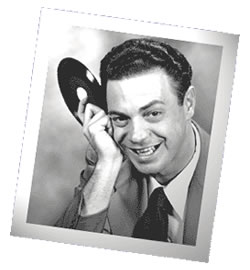
A Brief History of Payola
 See the gentleman on the left? That’s Alan Freed, the “Father of Rock and Roll”. As a radio DJ and music television show host in the 50’s, he popularized the term “Rock and Roll”, turning it from an obscure euphemism for sex into a household phrase for a music genre. He helped break the color barrier in music, introducing America to acts like Chuck Berry and Little Richard.
See the gentleman on the left? That’s Alan Freed, the “Father of Rock and Roll”. As a radio DJ and music television show host in the 50’s, he popularized the term “Rock and Roll”, turning it from an obscure euphemism for sex into a household phrase for a music genre. He helped break the color barrier in music, introducing America to acts like Chuck Berry and Little Richard.
His career and reputation were destroyed in the (painfully-named) Payola scandal, in which he accepted bribes from record companies to give their records more airplay. Dick Clark’s career was almost destroyed as well, but by cooperating with the authorities and selling off his share of a record company, he was able to have the charges against him reduced to a slap on the wrist.
(Freed, unable to find much work in the wake of the scandal, turned to alcohol and died of cirrhosis in 1965.)
Payola still exists today, thanks to a legal loophole. Rather than going directly to radio stations, record companies hire “indies” (independent promoters, not independent labels) to promote their albums — and by promote, I mean “provide payment as inducement to play their albums”. For more on the relationships between record companies, indies and radio stations, see this How Stuff Works article.
Radio: Bad for the Recording Industry?
Here’s a report from Techdirt earlier today:
Remember a few months back when the RIAA started asking the government to get radio stations to pay up for promoting their music? This seemed pretty ludicrous (especially when you add in the fact that record labels for years have paid radio stations via payola to get them to play their music in the first place). Well, the group organized by the RIAA to push this plan has found a professor to publish a study saying that radio actually makes people buy less music. This way, they can claim that radio actually is not a promotional medium for music.
Techdirt asks the question and I repeat it: If radio is bad for music as the RIAA says, why have record companies been bribing radio stations all these years?